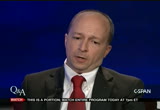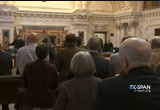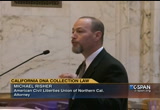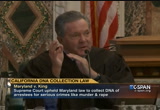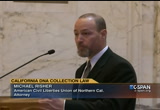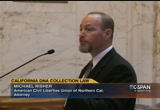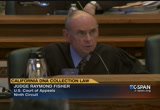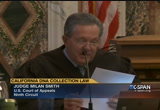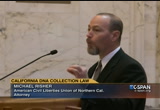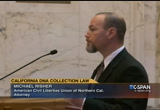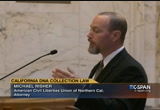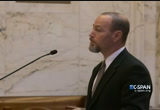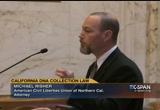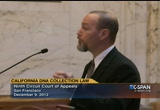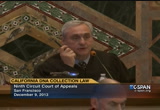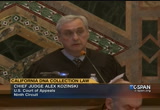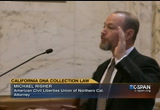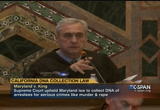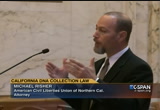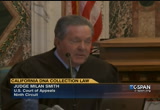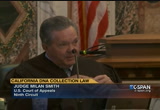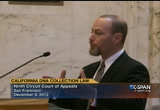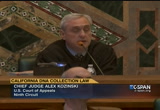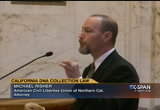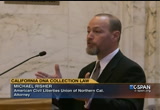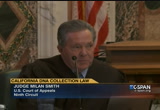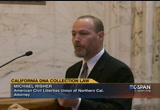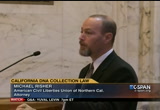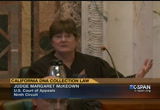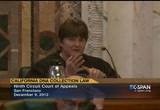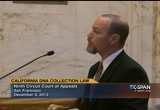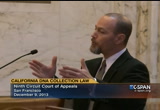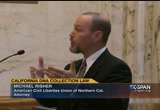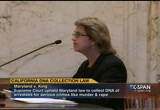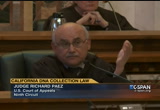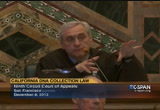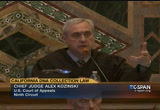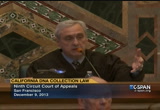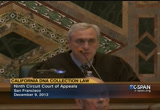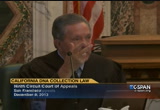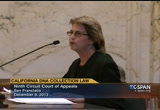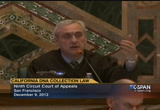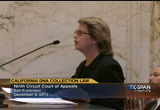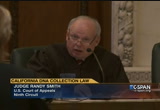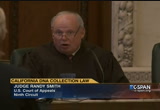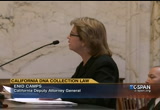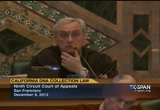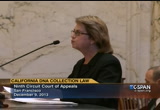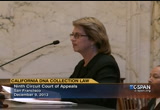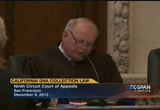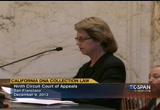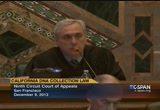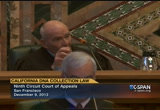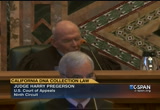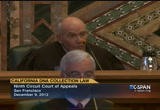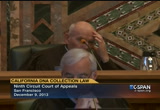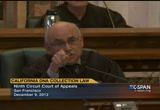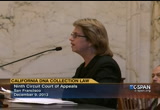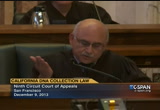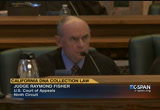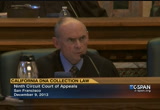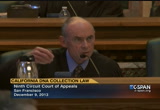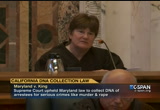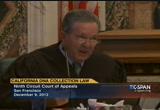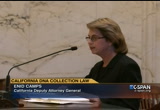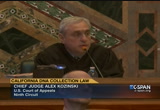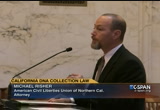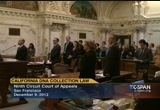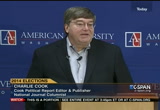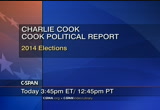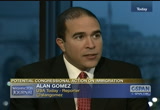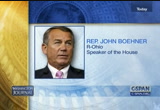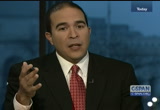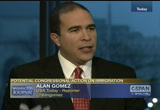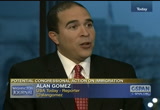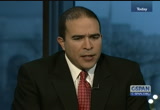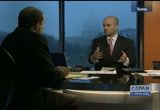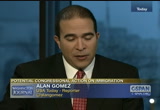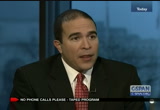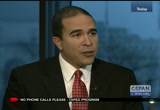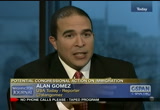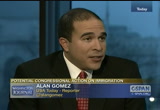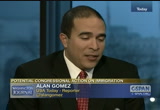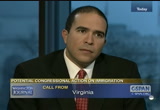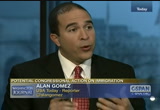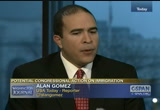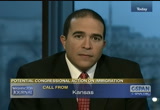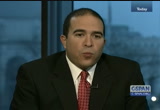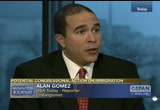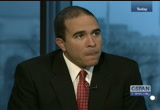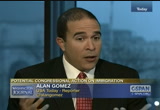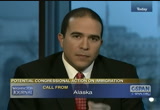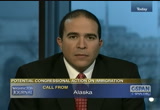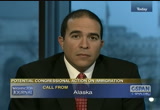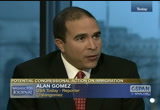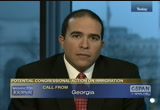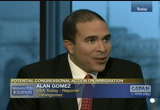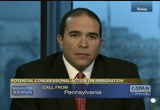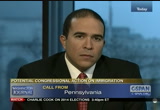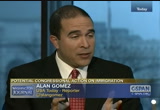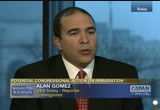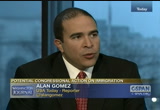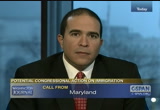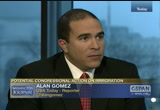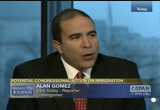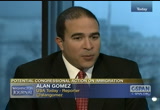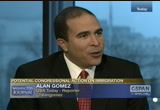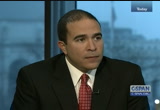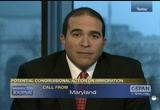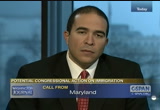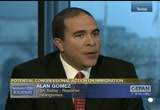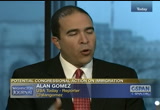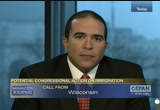tv Key Capitol Hill Hearings CSPAN January 2, 2014 12:00pm-2:01pm EST
12:00 pm
goes to my meetings. she said mrs. carter, mental health is just not a sexy issue. i never did get very much coverage for it. what wasund out needed, developed legislation and pass the mental health law of 1980. passed one month before he -- an voluntary removed from the white house. one of the greatest disciplines of my life. >> more from our first ladies series tonight. the first series on betty ford. tomorrow we will show you the recent first lady's program on
12:01 pm
rosalynn carter at 9:00 on c- span. today, joined us for more on the q&a series. is yuval levin. there is a look at some cell research. issues01 one of the big that the new president faced was the question of whether and how the federal government should fund embryonic still -- stem research. the question was whether it was moral it in the promise or potential of it to spend public money on that kind of research. the president made a decision in which he was advised that said you could spend money on lines that are it existed at that point, but not on new ones. of announcingrse
12:02 pm
that decision, he said these kinds of issues will stay with us. and we need help in thinking about them. he called together a group of 18 scholars, almost all of them academics who would come together several times per year to consider a challenging environmental question that has some public wallace the implication and provide information in terms of publication and reports. cloning,e a report on stem cell research. they wrote a report on enhancement technologies. wrote reports on carrying --caring for the aging aging, dementia and other issues. i think the counsel did important work. important work in the long run. the direct effect on public holocene is very hard to judge. shape the stem cell
12:03 pm
decision. while i think the work was useful in a number of ways and in certain particular junctures where those questions were there are more important lasting influences in the report. >> a portion of the conversation . see the entire interview today at 7:00 eastern here on c-span. we thought youif would retire on time. -- if you thought you would retire on time. a lot of responses. blake says you must be older than the to get a pension these days. you must be privileged and not a working person. not sure is i am want to retire. i write for a living and hope to do so for as long as i can. we encourage you to join in that conversation.
12:04 pm
>> sees brand -- c-span, we bring public affair events in washington directly to you. we offer complete gavel-to-gavel coverage of the u.s. house as a public service of high bit industry. c-span, created by the people -- cable tv industry 43 years ago and funded by your local cable like -- cable or satellite provider. now, you can watch us in hd. tonight sort -- circuit court of determine thely constitutionality of dna samples for those arrested for a felony. in 2009 police arrested elizabeth haskell at a rally against the iraq war and she was forced to get over a cheek swab tom although she was released without charges, her dna is not stored in the databank. the oral argument is one hour
12:05 pm
five minutes. >> good afternoon. please be seated. we're here for the argument of haskell versus harris. judge gould is appearing by video. good afternoon judge gould, can you hear me? i can hear you fine. >> okay, counsel ready? you may proceed. >> good afternoon. for the plaintiffs, i'd ask to reserve five minutes for the rebuttal. >> you have the clock. you'll have what is left over. >> may it please the court, this case is fundamentally different from king because california's law applies to people who are never charged with an offense and those who are discharged from lack of probable cause. there is nothing that can justify taking d.n.a. from these
12:06 pm
individuals who are not being prosecuted. king is tracking people as they go through the criminal justice system up through trial. >> counsel, i respect the sincerity of your view, but the reality is the supreme court said in king that d.n.a. was like fingerprinting. if all of the things that you say about your particular clients are true, they would still nonetheless be fingerprinted and their fingerprints retained in a national data base just like the d.n.a. how do you distinguish that? the court made it very clear several times that d.n.a. and fingerprints are of the same, constitutionally one is a more modern technology. >> that is not how i read the case. d.n.a. is different from fingerprints. d.n.a. is our genetic blueprint.
12:07 pm
fingerprints have a history of being used to identify people, they do an excellent job of that. people who are arrested can be identified within minutes using their fingerprints. none of this is true with respect to d.n.a. and if the court had simply wanted to say there is no problem using d.n.a. anytime our system wants to use fingerprints whether it's in the criminal justice system or applying for a drivers license it could have said. so instead king as required by other cases engages in a new totality of the circumstances balancing test and only after doing that decides that d.n.a. can be appropriately used in certain circumstances.
12:08 pm
>> counsel, are you challenging the initial taking of the d.n.a. or the subsequent use? it seems to me that on page 21 of the supreme court's opinion, the court wrote the additional intrusion upon the arrestee's privacy beyond that associated with fingerprinting is not significant and d.n.a. is a markedly more accurate form of identifying arrestees. i read that to means the okay to take the d.n.a. at the time of arrest which is what happened to mr. king as part of the booking process. isn't your argument really what the police do subsequent to the taking of the sample? >> yes. under king the government may take d.n.a. at arrest for people arrested for serious crimes. however it cannot analyze or otherwise use that d.n.a. unless formal charges are filed and there is a judicial finding of probable cause to believe that the defendant is in fact guilty of a serious offense. >> you say it has to be a serious crime but the examples that justice kennedy used were in making the point about
12:09 pm
utility of d.n.a. was the 9/11 terrorists and timothy mcveigh, both of whom were arrested or picked up, stopped on very minor charges. seems the thrust of the majority opinion is that d.n.a. no matter how it comes into the possession of the government in terms of an arrest is an incredibly valuable tool. i know they use the term serious offense, but it's a little hard to understand rationale of the majority opinion being limited to just serious offenses when they make the point using two examples of non-serious offenses.
12:10 pm
>> they do. but of course the reference to mcveigh comes from a quote from florence v. board of chosen freeholders. i think the significance to that quote is if they are encountering them in a traffic stop. but it does not allow them to take d.n.a. from every jaywalker or speeder. >> justice scalia -- i can't comment on the way he reads it he says at page 1989 when there comes before us the taking of d.n.a. from an arrestee from a traffic violation, the court will predictably and quite rightly say we can find no difference between this case and king. make no mistake about it as a consequence of today's decision your d.n.a. can be taken and entered into a national data base if you are ever arrested rightly or wrongly and for whatever reason. he was in the conference and heard what the majority decided,
12:11 pm
and that's how he reads it. how can we read it otherwise? >> i think it's fair to say that justice scalie and the majority read the fourth amendment and the interest involved in this case quite differently. >> i agree. but the reality is justice scalia was interpreting the majority opinion which is what controls us here as what he said. and if he is correct in his construction then you are out of luck, are you not? >> no, because the fundamental distinction between this case and king goes not to the seriousness of the offense. the fundamental distinction here is california is taking d.n.a. from people who are never charged with a crime or discharged for lack of probable cause. >> he says it doesn't matter if they are ever arrested. he says if you are arrested rightly or wrongly and for whatever reason. so i would respectfully suggest i don't see how you can justify
12:12 pm
your point. i get your point about what is done with it afterwards, but i don't about the seriousness of the offense or anything of that nature because justice scalia makes it very clear about what the majority meant and it's not what you mean. >> could you clarify one thing? >> yes. >> in king, i understood the situation to be that they could only collect the sample after the individual had been charged as opposed to simply just arrested, is that right? >> that's an ambiguity in king. yes, king repeatedly says that, people arrested and charged -- >> if you go to the regulations that the state attorney general issued in king justice department, they talk about
12:13 pm
charged and they defined charge as the filing of a ticket like issuing a ticket or a complaint or an information or something. but in california, as i understand it, your d.n.a. can be taken if you are simply taken down to the station, booked, and kicked out the door because they determine no crime was committed is that right? >> that's how it happens in california. king is ambiguous because they talk about people formally charged but they also talk about d.n.a. taken at booking. i believe d.n.a. should only be taken from people charged with an offense. but i do appreciate that the government does have some interest in taking d.n.a. before then, even if they can't use it in case the person fails to appear. i don't think those interest are weighty enough to justify taking it at booking and then using it. >> i thought the distinction was
12:14 pm
being correct that it's part of the booking process. but i thought maryland wouldn't process it until charged. >> correct. >> so there is the taking of the sample and then there is the profiling that comes by going after the limited identifiers, the junk d.n.a. aspect, that would be a distinction from california because california processes it right away. >> not right away. >> in other words, they don't wait for a charge. >> correct, and that is the fundamental distinction. >> may i ask you about that distinction though? and this may be because the supreme court wasn't clairvoyant in looking at the situation we have in front of us. but if you go to the end of the opinion of the court, actually the court on page 23 of its slip opinion, it keeps talking about
12:15 pm
in sum there is little reason to question a legitimate reason of the government when it's talking about "the identity of the person arrested" and it talks about identification of arrestees. what do we make of that language as you fold it into the california statute? >> well, the first time the court talks about the identification of arrestees, it's from florence or hibble where it says in every criminal case it's necessary to know who has been arrested and who is being tried. when we talk about identifying arrestees, it's talking about arrestees who are being prosecuted. because everyone in maryland who was giving a d.n.a. sample was necessarily being prosecuted. understand california it's important to remember that for the population that i'm most concerned with, those who will not be prosecuted at all, that decision they have been unconditionally released from the criminal justice system
12:16 pm
within 72 hours or two working days. that is long before the samples would even get to the lab. they are mailed to the laboratory. >> what they are talking about is they are saying as i read the supreme court you have an interest in knowing for example if they are wanted elsewhere. so if you have an arrestee who ultimately is not charged -- but isn't there an intervening interest of knowing if that individual is wanted elsewhere having been arrested? >> no, i think once the person once the decision is made not to prosecute, once the person is unconditionally released as was the case with three of our plaintiffs, that interest is no longer there. >> even before being released, the court acknowledges there is a government interest in knowing if that person is wanted elsewhere, is that not consistent with your argument?
12:17 pm
>> i don't think so. first of all, fingerprints is how that determination is made. if somebody is wanted is not done with d.n.a. if somebody is implicated in another crime is done with d.n.a. with california's infrastructure and most importantly with the current protections for privacy, that determination cannot be made in time to be meaningful for people who are arrested and then released before arraignment or at arraignment. because remember this court -- >> that was in king too, wasn't it? >> well, no. >> everything you say as was true in king and as judge smith pointed out and justice scalia pointed out in dissent. so where are we? you started by saying this case
12:18 pm
is different and all the interests, many of the interests in king don't apply here. justice kennedy conveniently lists them by number in the opinion. and i wonder if we could go down the list one by one and tell us which ones apply there that don't apply here. it starts on page 11 of the opinion says first and it goes on and lists them. can we go down quickly one by one and see which ones don't apply? the first one says there is a need to know that this is the right guy, this is the right person. that applies just as well here as it did in maryland, right? >> no, i don't think so. because it starts off in every criminal case. if there is no prosecution there is no criminal case. if you have someone who was arrested once but now is unconditionally released the government doesn't have that same interest.
12:19 pm
>> that was true in king too. that was true and nevertheless they said they could take it. it says, this is on page 12, the individual identity is more than just a name and social security number. and the government's interest goes beyond ensuring the proper name is typed in the indictment. true here, right? so then we've got second on page 13. law enforcement officials bear responsibility for ensuring that the custody of an arrestee does not create intolerable risk to staff and so on. equally true here as in king. >> not with respect to the people that i'm talking about specifically. because by the time -- mr. king was in custody long after d.n.a. had connected him to this rape. by the time d.n.a. results could help law enforcement in california, no, what someone has
12:20 pm
done in the past, whether this person might be dangerous, the people i'm talking about are not in custody, there is no need to make bail determinations. they are free people. haskell was in six days of being arrested issued a certificate saying no charges are being filed. her d.n.a. being tested 31 days later did not help the jail deal with security issues -- she was not in jail. >> so define for us what is the class or how do you define the people who to whom this lawsuit applies? as to the members of this class how do you define the people with regard to this class? it hadn't been certified, right? yes it was certified in july of 2010. >> that class encompasses everybody who is arrested?
12:21 pm
>> everybody who is arrested and is required to give a d.n.a. sample purely because of the law >> so you have to talk about everybody and that brings to us just like king. you can no longer talk about your individual people. you have to talk about the class. the class applies to everyone to whom the statute applies. in that respect the second thing here, the second interest is just like in king, right? >> well, there can be subclasses and there is the possibility of creating subclasses. but the fact there is a class that includes everyone does not mean everyone in the class is entitled to relief. here is the rule i'm asking for. california can take d.n.a. from people it arrests for serious offense. it cannot do anything with that d.n.a. unless there is a prosecution and a judicial finding of probable cause.
12:22 pm
absent one of those or if charges are dismissed, it should destroy the sample and expunge the profile. >> you made that point in your brief. this case is unusual in this respect. you and your co-counsel filed a brief with the supreme court in which you actually argued haskell to the supreme court -- 12 different points including the ones you make to us today. what impact if any does that have in our analysis of whether the supreme court heard your argument and what they said, how that applies? for example in the fingerprint analogy. everything you said about your plaintiffs would like wise be true of fingerprints. they get fingerprinted, those stay in the data base. whether or not they are charged or released and if they have a traffic accident whether or not people are charged. i'm having difficulty understanding how you can carve out from what the supreme court
12:23 pm
said, your particular people, particularly when you have literally argued haskell v. harris to the supreme court in maryland versus king, you made those arguments. >> the supreme court never mentioned haskell. >> they never mention our cases unless they are reversing it. >> they did mention other cases it upheld or struck down d.n.a. testing of arrestees. i don't think that article iii courts secretly reach out to decide other cases and i don't think you can judge that based on -- >> i'm simply saying they heard your argument, the very ones you are making to us today, despite your desire that they would go in a different direction, justice kennedy's opinion, which was just mentioned and we were
12:24 pm
going down those points, and scalia's interpretation of that, it seems to me that this distinction you are making on an applied basis can't possible hold water. this is like fingerprinting. your people don't get removed from the fingerprint base. they don't get removed from the d.n.a. base. >> i don't know that the supreme court addressed the issue you are presenting here because in this case california does not automatically destroy the samples if no charges are filed. so at least that part of the process is different. could you address that? you mentioned that was what your concern was. >> it is very different because in maryland as soon as charges were dismissed or if there was no finding of probable causes the sample would destroyed and not analyzed. in california it is different. even if there is no probable cause -- >> that is another case for
12:25 pm
another day. if somebody comes in and says i've been acquitted, my d.n.a. is still in the data base. i would like to bring an action on behalf of myself and all similarly situated to have that information expunged, then we'll take that up. that will be an interesting case, which i'm sure -- i don't know what the outcome of that will be. why is that something you decide now in a preconviction case with a class that you've practically admitted is too broad? why isn't the right thing to do here if not affirm, but at the very least why don't we need to send it back to reform the class? >> there is no need toe reform the class. >> you do concede there are people in your class that are
12:26 pm
just like king in every way. >> yes. >> and they lose. >> yes. >> how can we have a relief that is afforded to a class when you admit some of the people in your class don't get the relief? we can't reshape classes. >> what this court can do is announce the correct rule of law and the district court can apply that. the entire class is important because it's with respect to the entire class. those people who lose, lose. they are bound by that because they are class members. the proper remedy is not to redefine the class. that would be unfair to the government. the proper remedy is to institute an injunction that is the rule of law this court announces. >> how would you articulate that group of people?
12:27 pm
how would you say who are these people that win and lose? we know the ones that lose. they are the ones just like king. who are the ones that win? >> i would ask that the district court issue an injunction prohibiting with respect to all class members the state of california from analyzing or otherwise using d.n.a. taken under these provisions until formal charges have been filed and there is probable cause to believe the person's whose d.n.a. is at issue has committed a serious offense. >> you want to us rewrite the statute? >> no, i want an injunction that simply says in implementing this statute the state cannot violate the fourth amendment and injunction has to spell out what is prohibited and what is not. >> -- to remover herself from that?
12:28 pm
>> there is a statutory remedy to permit her to do that but she's not availed herself of that remedy. >> there is a remedy -- >> she hadn't pursued it but we don't know what the response would be. if they say yes we'll take it out and destroy the sample then she would get all the relief that she's entitled to, would she not? >> if that happened, yes. that would impose an exhaustion requirement. that doesn't apply under board of regions. that would impose an exhaustion requirement that is not appropriate here. >> would your argument also apply to fingerprinting? could you bring a lawsuit claiming that fingerprints that were taken from the same people that you just described are like wise unconstitutional because people were released and never
12:29 pm
charged? you've got this record that remains there after this occurs. the supreme court said fingerprints and d.n.a. are constitutionally the same for purposes of this setting. how do you distinguish between those two? >> i do not read the case that they are the same. they share common characteristics. they are different technologies. we have to analyze them differently. we could bring that suit and the analysis would then be whether fingerprinting, what are the interests there and the enters are substantially different. fingerprinting is supported by history. it is not at all -- it doesn't tell you -- you can't do family searching. >> you are talking about abuses of the statute and have you no evidence that it's been abused. justice kennedy started with the bodily examinations and then went to photographs and then they went to fingerprints and
12:30 pm
he said constitutionally that the same analysis applied. what i'm puzzled about is how you can say that when there is no evidence of d.n.a. abuse in this case, you can distinguish between an ability on your part to strike down a statute that allows the collection of d.n.a. from people who have not been charged and are released within 48 hours, no bail and so on and not apply the same thing to fingerprinting. >> because d.n.a. and fingerprinting differ in ways i just mentioned and there are three additional reason. first of all, i believe that the retention of the d.n.a. sample and the profile is a continuing infringement on fourth amount liberty. different from fingerprinting. >> also different from fingerprinting? they keep them. >> and they periodically run them against the system to see fit matches any new prints entered into the system. >> i don't believe the ridges on one's fingertips raise the same constitutional issues.
12:31 pm
the profile can be used, admittedly it's not being used right now but can be used for family searching. maybe not how it's being used now but why it's different from fingerprinting. >> let me ask you in a more concrete sense -- you're drawing the line at the judicial issue answer of probable cause, is that correct? >> that's one of the lines, yes. that and the charging. >> charging or judicial determination. >> yes. >> so if somebody gets arrested and the person is released so this is no immediate charge but then there is a hiatus. under your line drawing, although the d.n.a. wasn't collected at the time of arrest,
12:32 pm
the law enforcement could not utilize that d.n.a. in any way, is that correct? >> not until there was a charge, some sort of judicial finding of probable cause. >> even though arrested, let's say they may have been arrested on a rape and then there was a hiatus and there needs to be more investigation and they are not ready to charge and they are not detained so they don't need to be taken before the court, you are saying that even though the d.n.a. is now in the hand of law enforcement and you potentially have a complaining witness on a rape that the government is precluded from making that match, correct? >> no, i'm not saying that. >> they haven't been in front of a judicial officer and there has been no charge yet. >> in that situation the government has several options. if there is semen left at the crime scene there would necessarily be probable cause to get a warrant to test that
12:33 pm
sample. or under california law section 817 of the penal code they could get an arrest warrant precharging. >> there could be alternatives but having alternatives does not make necessarily a third alternative unreasonable or unconstitutional. so the question i'm asking is a yes or no one, and if you have this rape situation that i laid out, does this mean that the officers are precluded from using that d.n.a. sample for further investigation? >> they are precluded from using this law to test that sample. they are not precluded from using any of the other alternatives they have which are less intrusive. >> what's the difference between this law and the others? what's your response to what seems a logical question and that is because there might be
12:34 pm
other alternatives does not make this one necessarily unconstitutional. why couldn't they use the d.n.a. under this law? >> it's not reasonable and the availability of less intrusive alternatives. >> let's say we don't have a rape situation, but we have the d.n.a., the arrestee is let go for whatever reason, they now run the d.n.a. through the data base and they say this actually this individual is wanted in maryland for rape, murder and three other serious crimes. could they -- are they also precluded from making that match because the person has not yet had a judicial probable cause determination? >> they are not going to find out this person is wanted in maryland. they might find out this person is implicated in an unsolved case in maryland. if he is wanted, fingerprints will help them but this won't. >> if they run it through the c.o.t.u.s., they might find there is a warrant out in maryland or something else.
12:35 pm
but since fingerprints according to the supreme court are really the same as the d.n.a., you're simply saying they are stuck to the fingerprint alternative, they can't use this alternative. i just want to understand where you are drawing the line. >> c.o.t.u.s. will not help them find outstanding warrant. it will only help them find an unsolved crime and connecting it. that after this confirmation process. if there is an outstanding warrant they can find that. but that interest in simply connecting someone who has been released without charges, connecting him to an unsolved crime in maryland, that's the government's interest in solving cold cases that the supreme court refused to accept in king. they never listed that as a legitimate reason to take d.n.a. from an individual. that's remarkable. >> thank you.
12:36 pm
you're out of time. thank you very much. >> we'll hear from enid camps. >> good afternoon. may it please the court, d.n.a. identification of arrestees is a reasonable search that can be considered part of a routine booking procedure. this is the holding of the united states supreme court in maryland versus king and this holding is broad and unequivocal. the court does set parameters in
12:37 pm
the very next sentence of its opinion. when officers make an arrest supported by probable cause to hold for a serious offense and they bring the suspect to the station to be detained in custody, taking and analyzing a cheek swab of the arrestees d.n.a. is -- like fingerprinting and photographing -- a legitimate police booking procedure that is reasonable under the fourth amendment. >> probable cause determination was made by the court? >> yes. >> is that right? is that the case here in california under the statute we're we're dealing with? >> no, maryland takes the sample after booking and before and analyzes it only if there is a judicial finding of probable cause and charge. >> under our statute somebody could be arrested by a police officer for a felony out in the field. because they are arrested for a felony they have to be taken into the station and booked, correct? >> correct. >> for whatever reason the arresting officer may ultimately decide that there is not enough there and just release the defendant, correct?
12:38 pm
>> correct. he could also release the defendant prior to any booking. >> takes him down to the station. as i understand the california statute, at that point they could request and demand d.n.a. sample. >> at booking? >> yes. >> yes. and that is what maryland versus king permits. >> but there has been no judicial determination of probable cause at that point. >> no, none of the factors that the appellant identifies are part of the holding in king. >> the court says a valid arrest based on probable cause. so that's the premise of the ruling, and, as judge paez points out, in that case there wasn't subject or challenged because there had been judicial determination. now we're dealing with cases in our state where there is no such
12:39 pm
determination. so the basis of the court's opinion, the starting point is in doubt. so since -- i think when somebody is arrested, just from all the movies i've seen, they take them to the station and fingerprint them and take may a picture before anything else happens. >> and now they take d.n.a. >> it would be at that point. at that point there haven't even been charges filed? >> no, because taking -- >> i'm just asking factually how it happens. so at that point there haven't been charges filed. it's entirely possible, and i'm sure it happens somebody is taken to the station, booked, fingerprinted, and the police officer consults with the d.a. and the d.a. says no, here are the reasons we're not going to charge this guy.
12:40 pm
we're not enforcing these, have too many, whatever, and they decide to let him go. must happen, right? >> that's one of many options available. but not the only option. >> it's not an option. it's a factual scenario. >> it's possible. but there are a variety of things that can happen. >> of course. they could say we're going to book him and slam the door. but it is possible that nothing will happen. there will be no charge. it's possible that on consulting with the d.a., the d.a. will say we're not going to treat this as a felony, we're going to treat this as a misdemeanor. that's also possible. >> it's possible. >> it's possible the d.a. will say tell me more about the arrest. it sounds to me like the arrest was illegal. we are going to let him go because we don't want to get in a dispute about the legality. i take it under california law at that point the cheek swab
12:41 pm
would have been taken and the state is entitled to analyze the sample, right? >> that's correct. but the supreme court set -- >> none of those cases were dealt with by the supreme court because they assume probable cause and a valid arrest as a premise for the opinion. i mean, that's a fact, right? >> i don't think that's the case. the holding is very broad. when there is an arrest on probable cause and you've brought the individual to the station --
12:42 pm
>> we can argue about what the holding is, but just as a factual basis, as a premise, the court there was dealing with a situation where all the cases i've discussed are not included. the cases where the d.a. decide the arrest was bad. they didn't have a warrant or whatever, all those cases were not presented by the statute. >> correct. but the court set the time for collection at booking because the information that is available after booking can inform the charging decision. so in that scenario the charging decision isn't finished. the charging decision is still under review and subject to the information that is returned from the identification information that is obtained at booking. >> let's take the example that the chief just gave and substitute fingerprinting for d.n.a. let's assume that someone is arrested in a traffic matter and they are brought to the station. they are fingerprinted and booked and the d.n.a. is taken. but as the chief suggest the d.a. says this is weak. i'm not sure we have probable cause.
12:43 pm
are fingerprints removed from the data base because that occurred? >> no. they remain in the data base and they are not expunged. >> do you know of any state or the federal government that has an expungement statute for fingerprints? >> california does not have that process. even on an invalid arrest, the fingerprints remain in the fingerprint data base. >> this is part of what justice kennedy referred to that is reasonable under the fourth amendment is it not? >> correct. so d.n.a. at booking is the equivalent of fingerprints and that is what the court recognized. >> that may be so, but that is not in fact covered by the opinion. it may follow logically from
12:44 pm
what the opinion says. is the case talking about expungement of fingerprints? the very question that judge smith asked you about -- is there a case saying that has litigated a question of whether or not finger prints need to be expunged? i don't think there is. >> there are california state cases. >> yes, who cares. [laughter] >> for the individual -- >> federal law also as a retention policy. >> i'm asking has the case been litigated as a federal constitutional matter? i thought you were saying there are state cases dealing with it, and that's fine. is there a constitutional case dealing with retention of fingerprint?
12:45 pm
most of us gave up fingerprints when we became members of the bar. >> and the bench. >> well that was voluntary. we could have said no, i suppose. i gave out ten fingerprint sets. they couldn't get it right for me. but that's right. we all give up fingerprints. but is any case dealing with whether or not the state is entitled to keep fingerprints if you find somebody totally incident or that the arrest was illegal? >> i think that there are processes pursuant to federal law and state law where an individual can apply to have their arrest records expunged if they are found factually innocent.
12:46 pm
and i'm not sure whether or not that would encompass the same kind of expungement. i think, as far as i understand it, fingerprints are retained indefinitely and remain in the state and federal data base. >> if we deal with another issue besides just when one can keep the particular d.n.a. sample, can we deal upon when one can get rid of it? in maryland all samples and profiles are immediately destroyed if all qualifying criminal charges are determined to be unsupportive. but in california quite opposite occurs. in fact, even if someone wants to have his d.n.a. sample destroyed, he must send a request to the court, to the d.n.a. laboratory, and to the prosecuting attorney, right? and the court has the discretion to expunge and then if the court doesn't expunge then denial is unappealable, isn't that correct?
12:47 pm
>> the process -- that is not a full description. >> i didn't expect it to be a full because i haven't got all day to give it to you if i had to read the statute. but the bottom line is this is expunged only when the court has discretion and if the prosecutor says no, often it doesn't, it cannot happen? >> that is a very limited reading of that procedure. what the statute actually provides -- >> tell me then -- it seems to me there is quite a bit of difference between automatic expungement on one side and going through the process and maybe get it done on the other side. and therefore, is that not a difference we ought to take into effect? that's my question.
12:48 pm
>> it's not a difference of constitutional significance. >> why? >> because there is a valid procedure for an individual to have the d.n.a. sample expunged from the state's data base. there is an expedited procedure to do it and california has done it within two to four weeks. that's its average time. california modeled it's expungement process -- >> that is different from maryland, correct? >> it is different. >> the court has a discretion in california where in maryland there is no discretion whatsoever. and in california if the court says no expungment, there is no appeal and in maryland it's automatic expungement. >> there are statutory criteria for the judge to follow in the expungement provision and we'll assume that the judge will follow those provisions. there is a hearing to allow the department of justice to say if it hasn't already expunged the sample, look, this individual is qualified otherwise to have his sample remain in the data base because he's a registered sex offender or arson offender and so it gives in the event that d.o.j. doesn't expeditiously
12:49 pm
expunge the sample pursuant to its own procedures, there is another forum for the individual to say i meet this criteria. the judge could just say no and that would be it, right? >> it's hard to imagine that the judge wouldn't apply statutory criteria that is in the statute. >> is that a yes? the judge could say no and that would be the end of it, true or false? >> correct. that is a non-appealable decision. >> there wouldn't have to be an explanation. you wouldn't have to know why.
12:50 pm
>> we would assume that the court would follow the criteria. >> you could assume anything you wish. the fact is you wouldn't know. >> is there anything in kennedy's opinion about the reasonableness of the use of d.n.a. in the booking statute to expunge the d.n.a. if the person were found innocent? >> no. >> didn't even enter into his thinking, did it? >> it didn't. >> are you going to speculate on what justice kennedy was thinking when he wrote an opinion? that there was automatic expungement and there may have been no cause to address the issue. are you going to speculate on what he was thinking? >> i think the opinion is a very broad opinion. the court was well aware of the difference in expungement procedures. it was aware of the difference between california's law and maryland's law. as your honor pointed out, we told the court of the differences in california law, and the a.c.l.u. told the court of the differences in the
12:51 pm
california law, and the court was aware of the particulars of california law more than any other state. >> it decided the case based on maryland law. we also cover other statutes where rule is broad enough to cover anything other states may do. it's a typical justice kennedy opinion. he is a very careful common law kind of guy who takes a case in front of him and decides that case. that's how he writes his opinions. >> this was an intentionally broad opinion. >> but counsel, he kept putting in to his broader statements the foundational aspects, one of which included that there was automatic expungement. >> that appears nowhere in the opinion except in the recitation of maryland's law, which was dropped at that point.
12:52 pm
what is clear is that the court intended to set a national standard, it was aware that 28 states in the federal government have laws similar to maryland. it acknowledged that the state laws vary in their particulars and that is their word and it recognized that its holding goes beyond those particulars and "implicates more than specific maryland law." >> could i also reference you some other language? i grappled with this problem all the way through this, but it seemed to me justice kennedy said statutory safe guards on use are enough. that is statutory or "regulatory duty to avoid unwarranted disclosures generally allays privacy concerns avoiding unwarranted disclosures is more important." it seemed to me that was his approach.
12:53 pm
would you agree? >> his approach, he recognized the statutory and regulatory safe guard but those safe guard individual privacy and that is the lynch pin of the decision that standardize these procedures and that was the reference that the court in other parts of the opinion explained that these use and confidentiality restrictions in the law make the invasion of privacy minimal. it is those factors. c.o.t.u.s. does require expungement. >> so it would be different some of those restrictions weren't in place, hadn't been in place, right? >> i mean let's say for example maryland took all this information and put it online where everybody could reach it, sort of like the sex offender
12:54 pm
registry and the balance would have been difference, right? >> no. >> just no? >> no, because the court weighed the constitutionally significant issues in this case. the government interests -- >> one of the interests was on the one hand intrusion on the individual. and you don't think it would weigh differently if the intrusion on the individual had been much more serious if for example the coding had been done on non-junk d.n.a. but had been done on d.n.a. -- you don't think the weighing would have been different? >> yes, it recognized that as one of the significant factors
12:55 pm
that the intrusion is minimal. >> why aren't those privacy safe guards part of the balance in king? >> those set a national standard and all of the samples are processed pursuant to those standards there. there isn't leeway how to process these samples. >> how does he set a national standard when he emphasizes some of these restrictions that maryland law imposes? >> he didn't relegate it to maryland law. >> he was dealing with maryland law. when you think about maryland law and how it applies and how it protects a privacy and how it insists on probable cause and how it requires that the sample be destroyed, should the person not be prosecuted or should the
12:56 pm
person be found not guilty, all of those to my mind just fit into the balance, the balance here of dealing with a very intrusive interest in privacy. we are getting there and we are in a new age and a new phase of being able to not only identify people but to identify who their relatives were, all their problems, their mental problems, their physical problems, the whole picture is there. and so that's a very serious intrusion. and i think when he talks about these limitations, he's trying to strike a balance. and he was dealing with maryland.
12:57 pm
california is pretty extreme in the other way. you can arrest people who are joyriding, and you can book them as a felon, and it may turn out that they are convicted on a misdemeanor. we have a different system of law here. that is the way i read it. he's trying to strike a balance. >> the court struck a different balance and just because maryland law includes elements that go beyond what is required >> why does he emphasize them? >> maryland's law? he didn't emphasize maryland law. in fact he used california examples throughout the opinion. and just because maryland law includes elements that go beyond the fourth amendment does not
12:58 pm
mean that the constitutional bar is set at maryland's law. the u.s. supreme court has repeatedly recognized and made clear that the fourth amendment outcome does not vary with the laws of particular states. so a state can provide more protection and a state can enact limitations. but each of these rights and limitations does not go into the balancing test and affect the fourth amendment calculus. otherwise the fourth amendment would vary from state to state, and that is a proposition that the supreme court has rejected. >> what the state law happens to be like and what balance it strikes and how it protects the privacy interests. we have a difference of opinion than. >> if we uphold the judge's decision to deny prelimenary injunction, is there anything left of the case?
12:59 pm
would the case go back to the northern district of california for reformulation of the class and perhaps some kind of a pretrial on the merits? >> we think this case begins and end with maryland versus king. there would be nothing left of this case. >> you think that -- your position is that the supreme court's decision in king forecloses any claim that simple arrests, that an arrest that results, taking them down to the station and booking them and determining -- the cop, the arresting officer says i've made a mistake, let him go. d.n.a. is taken. it's your view that king forecloses any claim by these guys that they don't have a possible claim? >> right now there for one is a mismatch between the certified class.
1:00 pm
>> the class now in light of king is overly broad but they could narrow it down or do individual and try and set some precedent on an individual basis. >> it would be inconsistent with the holding in king to draw the line at charging. >> so as long as you're arrested, taken to the station and booked, that's it? >> right, because your identification information informs the charging decision. >> there was never a determination of probably cause. >> there are a lot of situations where individual can be arrested, booked, bailed out according to the county bail schedule and then given a notice to appear at a later date. so there is no finding of judicial finding of probable cause or a charging decision and
1:01 pm
yet they are on a bail and release. >> i understand that in the maryland statute that they could collect it but they couldn't test it. >> correct. so the court looked at that as a delay, not as a good thing but as a delay. so it's not that california is premature. it's that maryland is delayed in its analysis and was making that observation as well. and the court said the finding of the analysis goes to the efficacy. >> so when does it take place under the california scheme if at all? >> it can happen at a lot of different junctures? >> where? walk me through the process. >> well, it could be made -- >> when and where is it made? when and where is it made? somebody is arrested down on the street dealing in drugs, taken to the station -- where is the problem made? >> prior to that time and the case can be charged.
1:02 pm
and what is or what they can charge the defendant. >> and also be released prior to that time. the case is dismissed, but does not mean it is dismissed forever. if the district attorney doesn't charge right away it could be for a whole number of reasons. >> so bottom line on what you're saying is that there is no class of arrestees who could be picked up on technically what would be called a felony, everybody would agree, it wasn't a serious offense. they are booked but never really held in detention other than going through the booking process and then they are kicked loose. once they've had the swab taken, then the state is free to go ahead and analyze it and process it as occurred in maryland.
1:03 pm
and all of the rationale in justice kennedy's opinion about the criminal history and the protecting of the jailors and the imposition of conditions of release or revocation of bail, where do those come into play in that category of people? >> it comes into play at the out set. a felony is a serious offense, is the classic definition of a serious offense. but in the opinion it is also clear that there is no threshold of seriousness in particular. >> you are sort of reading out some of what justice kennedy elaborated on because he kept repeating serious offense. >> right and some of those examples came from california. >> that may be but i'm talking about one that wasn't one of those there.
1:04 pm
there is no burglary, there is no rape, there is no assault and battery. it is just somebody who got picked up on what is a wobbler, for example, and there is no assault or anything like that and the system itself recognizes it wasn't serious so they kick it out and that person's d.n.a. is now captured. fingerprints, we give up in lots of context. the big difference about d.n.a., two of them, one is they are building the fingerprint data base by arrest. you don't do that when you send a fingerprint in, you are matching it against a data base. now they are creating a data base and the fingerprint doesn't carry with it all the biological information that is associated with full d.n.a. and you are saying that california can take that full
1:05 pm
d.n.a., hold it in its custody, and for now only look at the junk d.n.a., but they've got anytime their custody. all the d.n.a. in their custody and there is no remedy because of maryland versus king? >> by law california can only look at discrete portions of identification by d.n.a. that is it, nothing else. >> what is wrong than what the proposal by ms. haskell recognizing what king does restrict to simply say go to the supreme court decision, it talks about arrest by probable cause. ms. haskell's counsel says we can draw the line and charges or judicial determination of probable cause, and therefore free reign under the california statute.
1:06 pm
what is wrong on that line as far as and during how king applies to this case? >> that interpretation would not be consistent with king which recognizes that the identification information, whether it is bigger prints, photographs, or d.n.a., and form the charging decision. >> counsel, what role does justice scalia's dissents -- how would this respond to the points, make no doubt about it, as a consequence of today's decision, your d.n.a. can be taken and entered into a national dna base if you are arrested rightly or wrongly, and for whatever reason. so he is saying even if they have probable cause, they got it wrong, something that did not chart, but you can be put there under the rationale of king. how do we interpret that? >> the decision -- justice
1:07 pm
scalia made a number of factual errors in that analysis. and there are criteria. the court announced what the criteria is for taking, keeping, and analyzing a sample. they would cross the line to take a sample from an ordinary citizen. there are criteria for analyzing and expunging the sample, and every judge on the u.s. supreme court recognized and focused on the national import of king. chief justice roberts stayed the maryland decision and recognition of the fact that implicates important features of approximately half the states and federal government, recognizing the important implications of king, justice alito said it was one of the most important cases be court would decide in decades. in the case itself, it said this holding implicate more than specific maryland law, and
1:08 pm
because a court's holding and legal determinations were not tethered to the four corners of the maryland law, there is no basis for appellant's claim that maryland law is constitutional but california law is not. >> thank you. >> thank you. >> you are out of time. would you like a few minutes for rebuttal? >> yes, please. >> tell me in the one minute you have, i need to see a minute on the clock, why isn't the best thing we can do here is simply affirm denial of the injunction, and the case would then be back in district court where you can reshape the class and make whatever claim you make -- why isn't anything else we say beyond that too much? >> because my named plaintiffs, lily haskell and others were not charged with offenses, they are
1:09 pm
entitled to relief -- >> they are now tied at the ankle with a class which is too big. if you had a broader one on behalf of them, you might have a claim, but how can we say in light of maryland versus king, the district court here has discretion by the nine discretion by denying interrogatory relief? >> it is a question of pure law. this court can say what the law is, the district court will ever implement that law, otherwise we may be appear again in a year or two in precisely the same situation. i do not think that serves anyone's interests. >> we would be up here on a fuller record. >> the record we already have is vastly bigger than it was the record in king. i think the rule i propose is a reasonable one that flows
1:10 pm
directly king's holding and reasoning that accommodates all of the interest that king identifies. i do not think additional facts are necessary to establish that. so i asked the court to subset now one way or another to be honest. >> thank you. we are adjourned. [captions copyright national cable satellite corp. 2014] [captioning performed by national captioning institute]
1:11 pm
>> earlier today, charlie cook highlighted the upcoming 2014 midterm elections and discussed brandinglican party's issues. here is a look. >> let's talk about the republican brand problems. i don't know if we need to dwell on this because it got talked about a lot coming out of 2012, but the republican party, you can blame mitt romney for his loss in his campaign. i think that was actually a winnable race, had been run differently. the obama campaign was a very ofrt campaign and made a lot
1:12 pm
smart decisions and the romney campaign not so much. notwithstanding that, when you look at other races, you can see there are huge problems facing the republican party. minority voters, when african- americans make up 13% of the electorate in your presidential candidate loses by 87 points, that is pretty bad. when hispanics take up 10% of the vote and romney lost by 44 group i like to point to is sort of making a statement, the smaller group, asian voters, three percent of the electorate. some, don't worry, i'm not going to say anything bad. let's do some profiling. what are the stereotypes of asians? working, entrepreneurial,
1:13 pm
capitalistic. lower unemployment rate than whites. higher household income. they tend to be culturally conservative. wouldn't that describe republicans? the attributes one would attribute to the republican party? and yet romney lost to the asian vote by 47 percentage points, three points more than the hispanic vote. that is really interesting to me. and the vote for congress was almost identical. you say, wait a minute. nobody was talking about asian voters. the thing about it is, when you look at the polling, when you sit through focus groups, the message minority voters across theboard are getting is republican party does not seem to like anybody that does not look like themselves. that a fair
1:14 pm
characterization? i do not think it is. but that is the message so many minority voters are getting and i think what is happening with the asian vote is symptomatic because that has a lot less to do with immigration or anything else. republicans have an enormous problem with minority voters and the country is getting more and more diverse. won the 59% of the white vote in this election. historically, -- if you got 59% of the white vote, you won the election. but it is no longer sufficient. an events a portion of hosted earlier today by american university. you can see the entire event at 3:45 eastern or at c-span.org.
1:15 pm
later today, an encore presentation of q&a with the editor of national affairs magazine, yuval levin. he describes it as a journal on public policy and political thought. he also talks about the health care law and the differences between left and right. today at 7:00 p.m. eastern on c- span. all this week, book tv is in prime time on c-span2. continuing with books on world affairs, starting with "the big truck that went by: how the world came to save haiti and left behind a disaster." idealist," and after book a discussion of the "why work matters: how economic growth and reduce poverty in
1:16 pm
india." tonight on c-span2. american history tv with programs on the 1920s, starting at 8:00 looking at culture and society. after that, the rise of gangsters in the prohibition era and a look at the role of the ku klux klan. later, a professor examines race relations. american history tv, tonight on c-span3. series on first ladies continues with a look at the life of any ford. during her time in the white touse, she raised breas cancer awareness and voiced support for abortion rights. she publicly shared her personal experience with alcohol and prescription drug addiction which led to the creation of the betty ford center. at life and career tonight 9:00 eastern on c-span and you can also listen on c-span radio.
1:17 pm
next, and discussion on immigration policy and what the chances are for reform in the next session of congress. this is 45 minutes. host: in usa today, alan gomez joins us to discuss congressional action on immigration reform in 2014. we're are having a midterm election year. how is that going to impact the prospect for a big new immigration form? how is that goe prospect for a big new immigration form? caller: they will have to do this relatively quickly. the closer we get to an election, the more difficult it becomes for members of the house and senate were facing close elections to want to take up this controversial issue. what we have now is -- there is some time early in the year.
1:18 pm
there is another window that they're looking at after the primaries. one of the big concerns here is that republicans who are not voting any thing might face a primary. there are these windows throughout the year. everyone agrees that when it gets too close to the election, it will be impossible. host: here's the story from earlier. the budget deal may clear the deck. take us through what will happen when congress returns. guest: what is going on is that speaker boehner -- basically, the senate has passed immigration bill. everyone is waiting for the house. the house has not done anything. they have not taken action on immigration. they have passed a few bills through committees earlier in the year. everyone is waiting on house. you have speaker boehner and republican leadership developing principles.
1:19 pm
this is what they want to see. they're proceeding with smaller bills. they will go out there and they might file that isabel. they will take it from there. they have done issues on border security and illegal immigration and how to bring in more workers. thing we have not seen from them in when everyone is waiting for is how they will handle 12 million undocumented immigrants living in the country. this would give them citizenship. apply for citizenship after 13 years. the house is more hesitant. we are saying a lot -- that's what we're seeing now. accessance between some and some who just want to legalize them. some do no one any legal status whatsoever.
1:20 pm
host: you brought up a large bill that was brought up last year. here's the lead story of the new york times. -- said tos that the back change on immigration. they're saying that the speaker is committed to a step-by-step move to revise immigration. talk about why the difference and the step-by-step approach. guest: the big concern these days is the bills that you can start throwing things into. ist the house has been doing exactly what the senate did. they passed this gigantic though. they're shoring up the southwest border. for jobs, they are required to check immigration status. they're expanding the legal immigration systems. also the big complement of the pathway to citizenship. the house has been very
1:21 pm
resistant. even the senate supporters have embraces the rubio idea of what the house is doing. they want to take it step-by-step. they can control it better and manage this. is they havee done passed three different bills. some on border security, some interior -- also some smaller bills. they're bringing those in the country. they think they can manage things better that way. things have spun out of control. they are especially worried about passing a big hill and then going into a conference committee and then who knows what comes out of that. that is the resistance right now. even if they end up passing smaller bills, you still end up with a lot of components.
1:22 pm
it is just a matter of how you approach it. we're talking to alan gomez. if you want to ask him questions or offer your comments, we're talking about the prospects for immigration reform. the phone lines are open. numbers are on your screen. while folks are calling in, we want to talk to you about the signals that speaker boehner is sending. about thebeen made hiring of rebecca tallon. who is she? guest: she is from the bipartisan policy center. she worked with senator john mccain. she is a veteran of these immigration fights. effect -- the fact that he
1:23 pm
has brought in this person to lead this of is a clear signal about his intentions. he really wants to continue pushing forward. you can look at the fact that the house has not passed anything. they have not considered an immigration bill. they have not filed a bill. to think that there is nothing going on there -- they see that hiring and they see that john boehner has spoken about the fact that he wants this to be a priority. he was immigration reform to happen. he put those together and that has caused celebration. at least optimism. speaker, works for the that she has written about how she thinks immigration reform could work. what has she said before? with: it has a lot to do
1:24 pm
bill is007 immigration an indication. she was working for john mccain. a lot of those components ever similar to what the senate passed last year. security issues was far beyond what they would've gone with. of allowing for these undocumented immigrants to go through this rigorous process. they're becoming green card recipients and then citizens. they're having a pathway opened. it is combined with these border security controls. that combination and balance of bringing together and giving republicans with they want. it is the type border and a final lockdown. we have been promised this for decades. outould bring the balance so that those who are here should have a path to citizenship. if they have a clean criminal record and all that stuff.
1:25 pm
alan gomez, the numbers are on your screen. alan gomez is with usa today. you can follow his work on twitter. some of the ideas of when a speaker boehner could move some of this. do republicans want to see this before the primary season or do they want to see it after? guest: it depends which republican you ask. when this whole thing got started, it was one year ago. it was after the 2012 elections. when mitt romney got 27% of the hispanic vote. the party elders saw that and said we cannot continue to compete on a national level if we only get 27% of the ever increasing vote. host: a lot was made of that. guest: exactly.
1:26 pm
that as onen view of the things that hurt them. that was one of the things they needed to turn around. for them, that is why you saw the senate pick it up. they really were pushing for some sort of immigration reform. they do not inc. that passing immigration reform will win them over the hispanic vote. to get them to have a conversation with hispanic voters -- if you are seen as too anti-immigrant, it blocks them from being able to discuss these issues. so, you have this national perspective. there's the idea that they want to get something done. theou're a house member, people that, you're saying we do not see a need for some like that.
1:27 pm
status of the national party does not matter as much. host: should republicans make more of a statement? could take on some of these voices in different parts of their party. from the party perspective as a whole, a lot of them will be very happy with that. forget the primaries, we are not worried about the elections and things like that, which i realized how ridiculous that sounds right when i set it. but, they could make the argument they are pushing for this and are actually taking action on it. if you are one of these many house republicans, they do not have hispanic populations in the district, and they have a very real threat of being primary on the right if they even so much about a supportively path to citizenship. many of them speak about it as amnesty.
1:28 pm
when did primary season and and when is the window? between march and may is when you see some of your vigor states. a lot of republicans there are very active. the tea party base is very active in texas. a lot of concern is right there. in may, you have a lot of other bigger states vanished with their primaries. immediately after that, you have a window there for a couple of months here at late spring as we get into summer. after that, we are looking at after the election. host: on twitter -- guest: how much time do we have? .e have not secured our borders we have people coming over from central and south america. what they have been doing, this
1:29 pm
is one of the areas where the obama administration has walked a fine line where they are trying to can't and you a steady and strong pace of deportation. people are here illegally, and then return them to the country. on the other hand, most of the supporters are calling on him to actually help those people. -- those deportations. it is difficult. on the border, it is chaotic still. pretty wide open. the senate passed a border for 20,000 more border agents to flood that region and lock it down. i visited the border quite a bit folks thered heard say more agents is not the answer. fullyhey are not supportive of it. the house has taken a different approach where they want to start measuring it better and take a more analytical approach
1:30 pm
better and identify more troub spots and that is where you focus your resources. there are different ways to get there and everybody agrees the border is not secure and it still has -- they need to figure out someway way to finally get it there before they can convince enough republicans to get on board. is in virginia on our line for democrats. good morning. caller: good morning. i think things could happen that could benefit america, i guess, understand i immigration has got to give the employer 24 hour notice before they come in to inspect and see if they have got any illegal immigrants working. i would suggest giving jail time to the amp lawyers -- employers
1:31 pm
if they are caught. got for bid putting job creators in jail. forbid putting job creators in jail. guest: we have seen a very different approach under president obama and president bush. prez obama's focus on worksite raids. we saw a huge raise of per -- poultry lance where they would come in and round up a lot of employees there, but then the owners, itith the was not the focus really. rounding up the workers and going at it that way. what the obama administration numberthey increased the of audits on worksite on companies. they have been not completely changing the focus but have been more focused on these employers. they say if you cut off the job
1:32 pm
and make it so employers understand their really will be a penalty and something to pay for bringing in a lot of illegal workers, that would attract them and stop them from hiring these illegal immigrants and reduce the magnitude of jobs to get here. at the same time, you balance that out by going after undocumented immigrants scattered around the country. but those are very different approaches. >> on the audit issue, did the senate will change the approach? it does not change the approach. think most people in washington now are looking at is expanding this program called e- verify. used by quite a few employers in the country and the federal government. does is when you go live for a job, they will not just do a criminal background check on you as they do now.
1:33 pm
they will also do and immigration check on you and run your information through federal databases to check what your immigration status is. it is an optional thing right now. some states started requiring some employers to use that. under the senate version of the bill, every employer in the country will be required to use that in five years. in the house, it is one of the bills they pass through their committees, requiring the program to go nationwide. as one of the things we talked about when you are allowing people to become citizens with a program like this, to pacify folks focused on the enforcement aspect of this. in kansas on our line for republicans. good morning. caller: gentlemen, i think this is not an issue at all. i believe we have plenty of laws that need to be addressed and fully. i do not think republicans are
1:34 pm
going to back down one bit. i do not believe we have seen john boehner or anybody else in the senate back down and i do not think you will see it now the republicans have to change america because the democrats have had a go at it and have i have had my whole social security number given to me by a man in india. i will be 85 next year. maybe next month. working. get on the ball. do not just sit there on your rear and do nothing. >> one of the main criticisms of the president has been he has not been enforcing laws when it comes to immigration enforcement.
1:35 pm
his administration each year has 100,000rted on average deaths reported on average 100,000 undocumented immigrants. it has gone down. one of the things the president has done over the last years is insulate a couple of different groups from deportation. we saw a couple of years ago when his administration issued a program, deferred action. undocumented immigrants who were brought to this country as children. -- he started a new program where these kids could apply to the federal government and they would have their deportation deferred. than 400,000 undocumented immigrants who fall in the category have been approved for the program. that is one big chunk. the argument is these kids have done nothing wrong. it was not their decision. why should they face the threat?
1:36 pm
months ago, these administrations formalized a program where if you are serving in the military, you do not have to worry about your immediate relatives being deported. they become safe from deportation. on the one hand, they see these moves and worry about a slippery slope and worry about obama expanding undocumented immigrants, but on the other hand, the administration is saying, we are deporting enough people. on folks with criminal backgrounds that have records. they do not want to waste the limited money they have to go after people and deport them on people who came here as kids. host: she does not think republicans will back down. other leading players on the republican side besides boehner? guest: it is all the republican leadership. paul ryan is an important player.
1:37 pm
he will be working this behind the scenes. it has been a big issue for him. he has been busy with the budget, but he has been a tokroom player pushing this some degree. to what degree, we are waiting to see still. eric cantor has spoken openly about the fact he is working on the representative who chairs the house judiciary committee. they are working on a bill to address those young undocumented immigrants. you run down the line. a representative out of california has been talking about finding the middle ground allowing for all undocumented get -- immigrants to citizenship and treating each group differently. he wants to give some to some and allow for citizenship for others. we are talking about all of the republican leadership and they are all involved in the issue. we are waiting to see what they end up doing with it. >> a comment from twitter.
1:38 pm
-- one other tweet -- calling in from alaska this morning is byron on our line for independents. caller: good morning. how are you folks doing this morning you go -- morning? i listened to the people talk about immigration for years. i am 62 years old and born and raised in alaska. then fathern my side. one of the most interesting things that came to my attention madehe so-called agreement between the united states government and the people of alaska back in 1950. public law, 85 508.
1:39 pm
an agreement made between all branches of the government, local, state, and federal. recently at our alaska federation convention, i'm sure mr. gomez probably heard about alaska is a part of the immigration reform bill. the interesting thing is, as i stated earlier, i was born and raised here in alaska. there were immigrants in this state before the state became a state area there were chinese russian,ipinos, german, mexican, all kinds of immigrants. today, this is the only state i know of that gives out free dividends to the people providing they reside here in alaska for a certain time.
1:40 pm
if you are to leave alaska, for will no reason, you longer receive this give a dent. the amounts are anywhere from 800 to $1000 every october. hispanics come up here working and processing plants and working in restaurants, entrepreneurs, you know, we are in the 21st century now. i filed suit against the state of alaska recently, asking them, why are you not in compliance with an agreement that was made in 1958? president obama sent me a letter informing me all states in the united states have to comply by set of rules.-- my documentation, my question to congress, was such an agreement made to all states in the united states? do you know about this
1:41 pm
agreement? guest: i do not know the specifics of that law but he raises a good point. the relationship between the federal government and how individual states camel image -- handle immigration, that has been much debated and much legislated. the most notable of which, arizona, in 2010, they passed a bill to really crack down on undocumented immigration in the state. wave ofked off a several states passing cymer laws and prompted justice department as well as a lot of immigration groups to sue the state and ultimately ended up here before the supreme court, where the court ruled immigration enforcement is, for the most part, solely within the responsibility of the federal government. we have had the battle for years now. the federal government, that is their responsibility.
1:42 pm
they can help but cannot adopt their own immigration scheme and try to carry it out. >> news on state action. this is from earlier in the week, noting today in nevada, immigrants living in the united canes without permission apply for authorization cards. that is starting the day the state is anticipating tens of thousands of people will apply under the program. our linen georgia, on for democrats, earl, good morning. good morning. but istate, a red streak, am a democrat all my life. i have been in the labor union. i see different places, new york, l.a., boston and las vegas. hand on the have a immigration promised because they had strong unions there. that i hopeas it they do not do anything because
1:43 pm
all we will hear about is them getting reelected and i am hoping they will make a big change and then we will get something done. that is my comment. thank you. guest: one of the interesting things about the debate this year is that unions during previous immigration debates at best. on the fence they have proposed some of these before. some of these attempts to legalize the population in the past. but you have seen most of the major unions getting on board this year. thatbalance out the idea yes, there will be a lot more workers competing against union members for jobs. at the same time, there is a realization there are a lot of people out there who could end up joining care that has been one of the interesting parts of this year's today that is different from before. host: we are talking to alan today immigration
1:44 pm
reporter. bill king writes in on twitter -- let's go to joe now in pennsylvania on our line for independents. good morning. me,er: i wanted to say, to immigration is the big issue. i do not care if it is state and local government, federal. i followed these politicians and how they will vote. i will not vote for anybody that agrees with immigration, illegal immigration. we need immigration reform, but not illegal. they would cut off all of these were most of these benefits. do not even have to
1:45 pm
act like they are stupid. they do not have to round them up. cut all of this off and people will go back by themselves. come over here legally. >> he said we need immigration reform, but not illegal immigration. what parts of immigration reform? the thing about illegal immigration is, if they were to go on the back of the line, they will get a fine. all of our flights would be $15. these people are poor to begin with and cannot afford that. most of the stuff with the politicians to make, they say they build the consensus a long time ago when the money was allocated. they could have solved this problem a while ago. maybe a fansy, will be built and maybe it will not. it is a political thing. it, youcomes down to cannot believe any of the
1:46 pm
politicians will follow through. that concerned, anybody in d.c. involved with this will say nobody is for illegal immigration. the bigaces what is issue here, which is what to do with the undocumented population. you can see right there he does not want to see them rounded up and deported. i do not even know how conceivably you can get 12 million people and take them out of the country like that. you raised another point i want to address. going back to the border security issue, i have been down there a few times and have seen very different parts of the fence and different trains. we go to california and you have got a triple fence constantly patrolled area because you have san diego right there. dmz zone. like that, its works and has been proven to cut down illegal immigration.
1:47 pm
you start get into these mountainous regions and new arizona,swer texas and the fence there has a limited capability. the joke is if you build a 12 foot fence could they will build a 13 foot ladder. you see where they created doors and swing open tonight and bring people and contraband in. they use catapults to put things over the fence and the o'connells under the fence. a fence in and of itself will not in any way stop those people coming over. it is finding the balance between a fence in certain places and technology like radar's and sensors. they started employing drones to monitor people out there and the right amount of manpower to be able to react to hotspots and where people are making the crossing. of the most interesting parts of the debate. it is really tough. >>, times have you been to the
1:48 pm
southwest border? >> several times. seeing the different regions, you talk to the sheriffs down there and it is funny hearing them when they talk about when folks come down from washington and getng eyes light up an understanding of the size and scope of it. that one of the most surprising things for you going down there? guest: yes. it is one thing to go then be done with it, but when you look at a place like mexico and arizona where it is nothing but if theynd a fence, even start cutting down the fence, how will you get to those guys? how will you get to them and respond to them and stop it you -- it? i hear for this quite a bit. look at israel.
1:49 pm
not a lot of people cross over the wall. it is not a 2000 mile wall. the crossing from southeast texas to western california is incredibly large. you have the oceans where they are coming around on both sides. locknormity of trying to that down is incredibly difficult. it is one of those things they need to spend more time figuring out that strategy on how to finally do that. robert is in maryland on our line for democrats. caller: good morning. i am thinking like this. help me if i'm wrong. these immigrants do not make much money. they still pay federal taxes and still use our health care system. get from them help social security and some of our expenses. the obama health care bill will cut down the cost of these
1:50 pm
people being here as far as oneys are concerned. we have to incorporate them. let's go ahead and incorporate people. and no american wants to go out and pick crops for 5000 or $6,000 an hour. some of them become entrepreneurs and like all of us, we are all immigrants here. i am thinking, let's try to make use of their abilities and what they have to offer america. guest: the economic impact of legalizing undocumented immigrants has been very controversial debate. for years now. in 2007, the last time congress really made a good attempt at reforming immigration laws, the heritage foundation, a conservative group in
1:51 pm
washington, came out with a study that said it would be a huge financial drain on the country, because of how much they would take on medical benefits going to schools and using our roads, that the drain it would have on the economy would be bad. i have heard opposite for more traditional liberal groups arguing that the amount of money -- a lot ofh taxes them do pay taxes -- we only have an image of field workers -- but they do pay into social security. right now, they will never be able to assess. they do pay medicare system. year, the congressional budget office weighed in on the senate bill and found over the long-term and short-term, it would be how much they're paying in the system and taxes, and if
1:52 pm
they are all fully legalized, how much all of them would be paying in taxes would be far in debt far outweigh it. been able toave hold onto that and say, this is also an economic argument we are making. it has been something that really changed the debate. impact oned about the the republican party and republican politics. talk about the democratic side. do they risk a pushback from the latino community if they do not move immigration reform in 2014 after promises and comments about this from the president on down? absolutely. one thing to say you want to push on this. democrats have been pushing on this kind of bill for many years. the fact we are getting so close and the fact it passed the senate and the fact is there and you can almost taste it and if
1:53 pm
they do not get it done, yes, i would expect quite a bit of backlash. a good example is somebody like the representative democrat from chicago, long been a champion for immigration reform, he is getting protested because they're not getting it done. ofhe is part of the group house members working together last year before they ended up disbanding on their efforts. guest: exactly. they have been working for years to get a bipartisan effort in the house. that has failed so they are going a different route. the fact that somebody like him, you could not ask for more of a champion for immigration reform on this congress, most folks in is the leader in the house. even if he is getting protested for not getting this done fast enough, it is a clear indication angerwill be plenty of toward these guys for not getting it done.
1:54 pm
the president for the longest time last year, the entire focus of the immigration community was on the house republicans, getting them to push and take up the senate bill and do something to get moving. year, youe fall last saw the advocacy community split a little bit. a lot of them started throwing focus on the president saying, if we will market the stunning congress, you have to stop deporting so many people. i was there a few months ago when a bunch of undocumented immigrants handcuffed themselves to the gate outside the white house in an act of civil disobedience to bring the focus on the president and say, you are not off the hook on this either. we have seen more of that in the last few months. they will get quite a bit of backlash if this all falls through. correct the numbers out recently, 369,000 deportations in 2013. down from a high a few years previous. >> of last year.
1:55 pm
410,000. each year, we have been setting a new record for the number of people deported. year was a this decline. they explain a lot of the people they are targeting for deportation, more of them have criminal backgrounds, they say that takes more time to process them, which is why the number has gone down, as you could imagine if you listen to folks on other sides of the argument. they view this as a continual and the president really wanting to deport folks. host: up next in maryland on our line for republicans. caller: good morning. happy new year. state -- s, in my hello? on-site. .iving illegals drivers license we had 13,000 apply.
1:56 pm
but they had to prove they pay taxes for two years or have been a dependent. the other guy from marilyn said, they take a low income jobs and they pay taxes. you think about it. if they are taking low income -- arepaying jobs, they getting more back than they paid because they are getting earned income. my sons do construction and a lot of illegals do it. they make more than my sons make on jobs. these here take construction jobs and all. i know because my sons have been doing it. before i gotction old. so i know. they are bringing in diseases. i am not condemning them.
1:57 pm
it is not their fault. but we have a lot of coming in from other countries and that is all ofe are getting these here different diseases. something has to be done. host: i will let you address your comments. guest: speaking to the jobs they are taking and doing, i can tell you have spent a lot of time as well. agriculture, it really is looks farming, the way to do the fieldwork and the harvest and things like that, it is really hard for these farmers to find americans willing to do the work. backbreaking work. the hours are intense and then go away completely for a month at a time. it is seasonal work so they have to move around the country. a lot of these farmers especially are having a really tough time finding enough americans to do it. a lot of the undocumented
1:58 pm
immigrants are more than willing to do it and travel around. when you start getting into jobs and retail andon working in restaurants and things like that, it gets trickier. americansa lot of willing to take on that kind of work. a lot of undocumented workers are definitely working in that field. one of the things we saw in the senate will, they create a new visa for workers in low skill work. janitorial jobs and restaurants. the thinking is trying to strike the balance between a lot of employers trying to cut corners, but the demand for the work is still there. they think they can regulate it a little better that way if they create a new visa category and whatble to monitor employment conditions are in the country on a year-to-year basis and allow a certain number of foreign workers to come in and take the jobs. you at worktime enforcement on top of that and the thinking
1:59 pm
employer, i i am a could not hire undocumented immigrants and then i would have access to some foreign workers if i really needed them. >> bonnie seemed particularly concerned about vaccination issues. is that thing that is a concern in other communities? not that i've come across. i have not spent a lot of time looking at that and i'm not sure. coming fromll wisconsin on their independent line. good morning. caller: good morning. , asst wanted to point out far as -- most people are so that wended to the fact are sort of in fear of letting most of these people into our
2:00 pm
country. i grew up on a farm in the middle of wisconsin. my parents will probably never be able to retire. be able to retire like most of the people in the previous section you guys were talking about retirement. think we should be more accept date of these all and what they have to offer. i am going to school for political science right now. i do not like the intolerant of it. know, i have aot book in front of me, it is by michael walzer. i am in the middle of this part that is based on immigration and ju
89 Views
IN COLLECTIONS
CSPAN Television Archive
Television Archive  Television Archive News Search Service
Television Archive News Search Service  The Chin Grimes TV News Archive
The Chin Grimes TV News Archive 
Uploaded by TV Archive on

 Live Music Archive
Live Music Archive Librivox Free Audio
Librivox Free Audio Metropolitan Museum
Metropolitan Museum Cleveland Museum of Art
Cleveland Museum of Art Internet Arcade
Internet Arcade Console Living Room
Console Living Room Open Library
Open Library American Libraries
American Libraries TV News
TV News Understanding 9/11
Understanding 9/11

